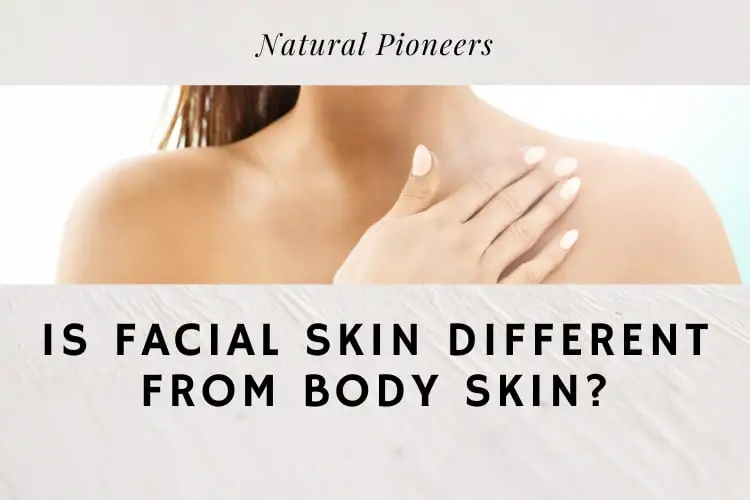
Why does our face need extra care? We researched the scientific database along with dermatologist interviews to find the 5 factors that differentiate our facial skin from our body’s skin. You’ll be surprised about what we found!
Facial skin is different from body skin as it is the most sensitive skin with a relatively poor skin barrier. The high sebaceous gland density makes it the primary spot for acne. Extremely thin skin around our eyes, along with many facial expressions and high sun exposure demand for extra care.
Let’s get an overview of the 5 differentiating factors and then dive into each on of them.
1. Facial Skin Is Different | 5 Facts
I was in the process of purging my cosmetics and personal care products when I thought: Why does our facial skin need special care anyway? Why are there cleansers, scrubs, toners, serums and moisturizers for our face and not any other skin on our body?
Being a minimalist myself, I was wondering if all these face products were required at all. I kept thinking: is facial skin really different or is it identical with, say, the skin on my forearm?
I went down the rabbit hole to find out. Numerous studies and dermatologist consultations later, this article will cover the 5 facts that do make facial skin different. And here’s what studies found:
- Facial skin is the most sensitive
- Acne occurs primarily on our face
- Facial skin is the most exposed to the sun
- Some areas of our face have very thin skin
- We make a lot of facial expressions each day
Let’s dive into each of these points to understand what they are about.
2. Facial Skin Is The Most Sensitive
According to studies, facial skin is the most sensitive skin on our body.
Let’s clarify what “sensitive” means:
“Sensitive skin is defined by the occurrence of unpleasant sensations in response to stimuli that normally should not provoke such sensations, and which cannot be explained by lesions attributable to any skin disease.” [1]
What this definition is trying to say, is that sensitive skin is irritated by things, that normal skin wouldn’t notice. Simple as that.
Studies find that there are 3 major factors involved that make facial skin the most sensitive.
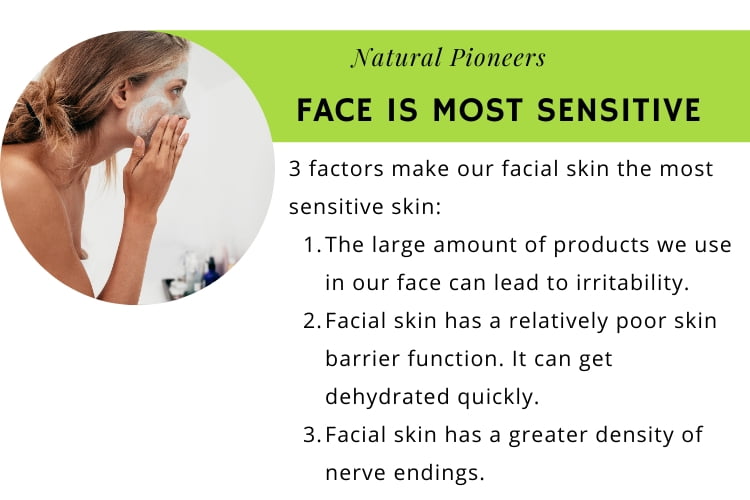
Reasons Why Facial Skin Is The Most Sensitive
- The large amount of products we use in our face can lead to irritability. [2]
- Facial skin has a relatively poor skin barrier function. [3] It can get dehydrated quickly. [4]
- Facial skin has a greater density of nerve endings. [5]
Alright, we know that our facial skin is more sensitive. And we understand that a hydrating & moisturizing product makes sense, as our facial skin dehydrates more quickly. Let’s now find out why we get acne primarily on our face.
3. Why We Get Acne On Our Face
Our skin has the highest sebaceous gland density. These glands secrete sebum, an oily, waxy substance that lubricates our skin. People with oily skin suffer from excessive sebum production while people with dry skin produce too little sebum. [6]
“Essentially everyone has combination skin, and I would say you’re on the very low end of that spectrum — your skin is extremely normal all over. The area of the face with the greatest density of sebaceous glands is in your T-zone — your nose probably has the most.” [7]
Adarsh Vijay Mudgil, MD – New York based Dermatologist
One of the causing factors of acne is increased sebum production, and since our skin has the most glands, that’s where acne is most likely to occur. Therefore, it does indeed make sense to use a gentle cleanser to clear excess sebum particularly in oily skin.
These glands aren’t overall bad though. In fact, studies show, that areas in our face with the most glands are those where we get the least deep wrinkles. Hence, later in life, you’ll be grateful for the amount of glands you have on your chin, nose, and forehead – as your wrinkles won’t deepen. [8]
Got it! A cleanser makes sense as well to keep sebum production at bay. Now, let’s take a look at sunlight exposure.
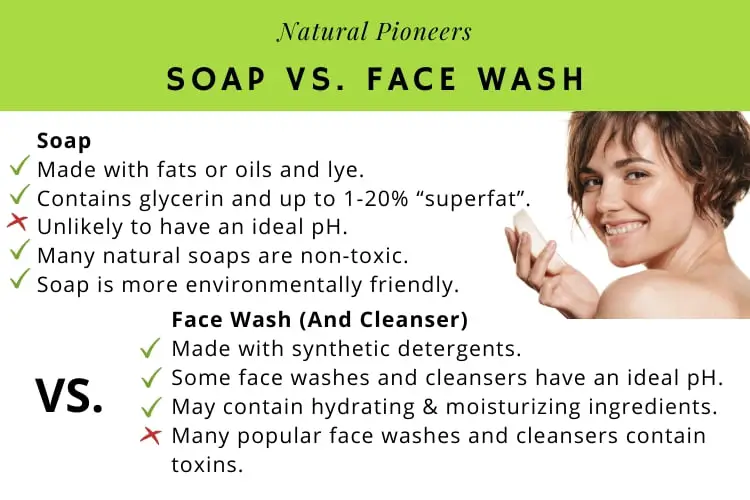
>> Read more about acne & the benefits of Dead Sea mud
4. Sunlight And Its Impact On Aging
Growing up with dermatologists in my family, sunscreen wasn’t much of a choice but a must! When talking with dermatologists and looking at studies, they all agree on this:
“Sun protection is the single most important thing to ensure your skin looks good for a long time. All the other things you could do to your skin are so minor compared to sun protection — and it’s not just sunscreen: clothing and hats and just not baking in the sun.” [9]
There we have it. And while our facial skin doesn’t necessarily react different to the sun, it is exposed to it the most! Therefore, our facial skin is in need of extra care and protection. Sunscreen, hats, and clothing can all help to minimize sun-induced aging signs.
As one study put it:
“Each one of our experts [4 dermatologists] mentioned that the single most important thing to remember when trying to maintain youthful skin is the daily application of sunscreen.”
Another valid reason to use products that are made specifically for our face. A hydrating & moisturizing product with SPF makes a lot of sense when trying to keep our skin youthful. Skin thickness is another factor to consider. Let’s look at it next.
5. Skin Thickness And Youthful Skin
Thicker skin does age better – the myth is true. According to dermatologists, aging signs are a combination of wrinkles, hyperpigmentation, loss of elasticity, and loss of volume.
“Thick skin is a literal compliment […] if you have thicker skin, the signs of aging are less noticeable.“
Dr. Dara Liotta, Plastic Surgeon
Our DNA determines whether you were born with thick skin, genetically, those with more melanin-rich skin (such as Hispanic, Mediterranean, Asian-American, and African-American people) have thicker skin, and are at a clear advantage. [10]
Guess, as a redhead, I don’t fall into this category. Oh, well!
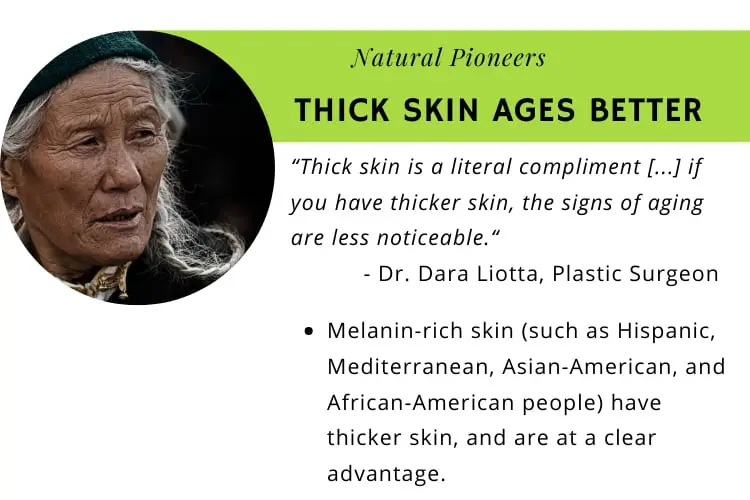
Some areas in our face are especially thin. The upper eyelid has the thinnest skin (a prominent area to use Botox), followed by our neck area and lower eyelid. [11] Dermatologist John R. Stanley explains that these areas are much more prone to irritation and that a cream for that area should ideally be a moisturizing without other components. [12] A cream without components – I believe I know of something you already have in your home!
Right, coconut oil! This non-toxic, natural oil is a true all-rounder. Here’s how I use it.
Remove Make-Up & Moisturize your Eyes With Coconut Oil
If you wear mascara, like I do on most days, use coconut oil as a makeup remover. Simply use a tiny bit of coconut oil, apply it onto your eyelid, work it into your lash line to remove all mascara, and wipe it off with a tissue. I do this every night.
It’s a 4-in-1 solution: It’s safe (non-toxic), it conditions your lashes, it moisturizes your eye area (no more eye cream), and doesn’t sting a bit.
After removing my mascara, I wash my face with a gentle, non-toxic cleanser. The moisture from the coconut oil remains untouched by the cleanser and leaves my eye area soft and moisturized throughout the night.
If you don’t wear mascara or eye-makeup, simply apply a tiny bit of coconut oil around your eyes at night. If you use it with a little warm water with it, it’s much easier to spread.
While I personally don’t use an eye cream product, I understand why it makes sense to use a moisturizer for your eye area (be that coconut oil or eye-cream). The extra thin skin areas in our face require a little more attention than the rest of our skin. Let’s take a look at facial expressions next!
>> Read more about non-toxic mascaras
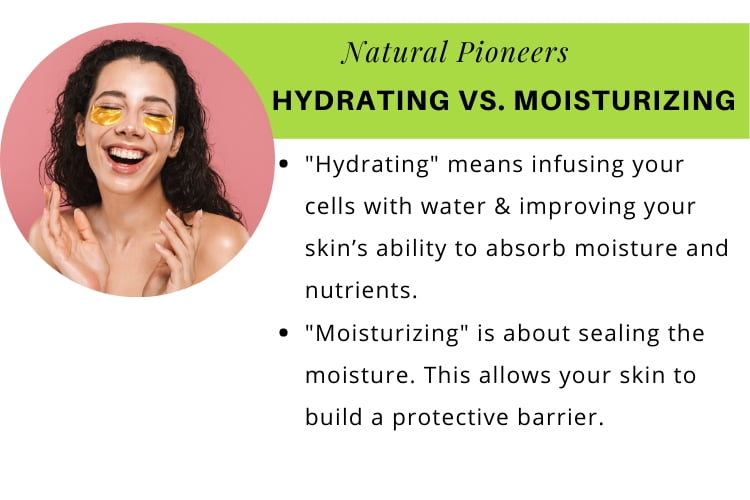
6. Facial Expressions
We give our face a pretty good workout each day. Happy, sad, fearful, angry, and surprised facial expressions are only a few of the 21 expressions we can make with our face.
Repeated facial movements and expressions, such as squinting or smiling, lead to fine lines and wrinkles. As skin ages, it loses its flexibility and is no longer able to spring back in place. These lines or grooves then become permanent features on your face. [13]
Studies show that it is harder to recognized negative facial expressions in older people. Once our skin has aged, fear and anger are hard to spot. However, happiness and disgust recognition is less affected. [14]
While minimizing facial expressions can help you look younger for longer, it is only one out of many factors that lead to wrinkles. [15] Let’s look at it this way: The more you practice your happy facial expressions by smiling, laughing, and being silly, the more likely you’ll have those happy lines on your face as you age.
I believe we should use all the facial expressions we can, live life to the fullest, and embrace the crow’s feet and laugh lines that make up the lines of our lives. Taking good care of our skin is all that’s required!
Let’s have a word on facials and talk about the ideal skin care routine according to studies and dermatologists.
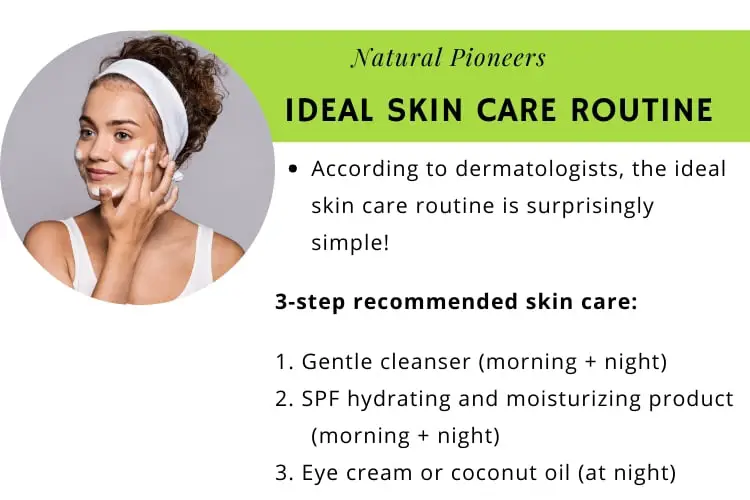
7. A Word On Facials & Skin Care Routines
We all love facials! The pampering, combined with a soft & smooth skin after you leave the spa are enticing. But what do dermatologists think about facials? Buckle up!
“I never recommend this to my patients. Whenever you have darker pigmentation, and the facialist squeezes out whatever is there — pimples and the like, they can do a lot more harm than good, in the sense that you can end up with hyperpigmentation which can take months to go away.” [16]
Adarsh Vijay Mudgil, MD – New York based Dermatologist
Professor Dr. Stanley, said they got it partly right, “I can certainly see how getting a facial could aid in stress relief — and I guess you could say that relaxation modulates the immune system, but a facial is not going to have a direct effect on immune cells. And note that what we said before is in direct opposition to what they’re saying: facials can cause inflammation and then edema, and they’re saying that a facial causes less fluid in the skin. If you have less fluid in your skin, you look dry.” [17]
Alright, no more facials. But how can we best take care of our skin at home?
Dermatologist, Dr. Mudgil recommends washing your face with a mild cleanser twice a day and using sunscreen on a daily basis, regardless of the weather (even in rain or snow). [18]
In addition, we learned that a moisturizer for your eyes at night supports the thin skin around our face. It’s really not complicated!
>> Learn more about non-toxic cleansers and face washes here
8. Conclusion
Our facial skin is different from our body’s skin. We’ve compiled studies and dermatologist’s opinions to find that there are 5 reasons why our facial skin requires extra care.
1. Facial skin is the most sensitive
Our facial skin has a relatively poor skin barrier function and can get dehydrated quickly. Therefore, a hydrating & moisturizing product makes a lot of sense and supports healthy skin.
2. Acne occurs primarily on our face
Our face has the highest sebaceous gland density. These glands excrete sebum – and increased sebum production is one of the causing factor for acne. Hence, using a gentle cleanse twice a day is ideal to keep sebum production at bay.
3. Facial skin is the most exposed to the sun
Dermatologists agree that sun protection is the single most important thing to ensure your skin looks good for a long time. Since our face is exposed to the sun the most, a daily moisturizer or hydrating serum with SPF is ideal.
4. Some areas of our face have very thin skin
Some areas in our face are especially thin. The upper eyelid has the thinnest skin, followed by our neck area and lower eyelid. These areas are much more prone to irritation and dermatologists recommend a moisturizer without other components. We recommend coconut oil which is an excellent moisturizer, has no other components, is non-toxic, natural, and can be used to remove mascara or eye-makeup as well.
5. We make a lot of facial expressions each day
Repeated facial movements and expressions, such as squinting or smiling, lead to fine lines and wrinkles. As skin ages, it loses its flexibility and is no longer able to spring back in place. These lines of our lives then become permanent features on your face. Since we work our face a lot throughout our lives, it deserves extra care to keep our skin healthy and young.
The ideal skin care routine is surprisingly simple! Dermatologists recommend using a mild cleanser twice a day, a hydrating & moisturizing product with SPF, and some eye cream (or coconut oil) at night.
3-step dermatologist recommended skin care
1. Gentle cleanser (morning + night)
2. SPF hydrating and moisturizing product (morning + night)
3. Eye cream (at night)
